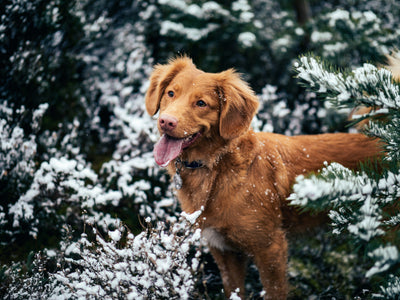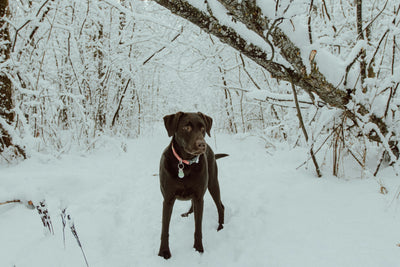Read the post to find a 10% discount code on Pumpkin Puree!
Pumpkin is often celebrated as a superfood for humans, but its health benefits extend to our furry friends as well. Rich in essential nutrients, pumpkin can be a game-changer for pets, especially when it comes to digestion, hydration, and even weight management. This blog will take a deeper look at how incorporating pumpkin into your pet's diet can support their health and well-being. You’ll learn not only why pumpkin is good for pets but also how it works on a scientific level.
- Supports digestive health and bowel regulation
- Rich source of vitamins, antioxidants, and fiber
- Aids in weight management and hydration
- Potential natural remedy for parasitic worms
Is Pumpkin Safe for Pets?
Before diving into the benefits, it's important to understand that plain, cooked, or canned pumpkin (without any added spices, sugar, or salt) is generally safe for both dogs and cats. Both the flesh and seeds of pumpkins can be beneficial, provided they are served in moderation. However, pumpkin should always be introduced gradually to your pet's diet to avoid any sudden digestive upset.
1. Promotes Digestive Health

One of the most well-known benefits of pumpkin for pets is its ability to promote healthy digestion. The fiber found in pumpkin works wonders for both dogs and cats, especially when dealing with gastrointestinal issues like constipation or diarrhea.
The Science Behind It:
Pumpkin is packed with soluble and insoluble fiber. Soluble fiber helps absorb excess water in the intestines, which can be helpful in firming up loose stools (diarrhea). On the other hand, insoluble fiber adds bulk to the stool and helps move waste through the digestive tract, aiding in constipation relief.
- Soluble fiber forms a gel-like substance in the intestines, slowing digestion and helping to regulate bowel movements.
- Insoluble fiber speeds up the movement of waste through the gastrointestinal tract by adding bulk to the stool.
How to Use Pumpkin for Digestive Health:
- For diarrhea, you can mix a tablespoon of canned pumpkin into your pet’s food for small dogs or cats, and up to a quarter cup for larger dogs.
- For constipation, the fiber content in pumpkin adds bulk to the stool, promoting smoother digestion.
Recommended Amounts:
- For dogs: 1 teaspoon per 10 lbs of body weight once or twice a day.
- For cats: 1 teaspoon daily.
2. Rich in Nutrients: Vitamins and Antioxidants
Pumpkin is loaded with key vitamins that contribute to overall health. Vitamins A, C, and E are particularly notable for their immune-boosting and skin-healing properties.
- Vitamin A (Beta-Carotene): Essential for vision, immune health, and reproduction. Beta-carotene, the precursor to Vitamin A, also acts as a powerful antioxidant, helping to reduce inflammation and protect cells from oxidative damage.
- Vitamin C: Known for its antioxidant properties, Vitamin C can help reduce cellular damage and support the immune system.
- Vitamin E: Another potent antioxidant that helps maintain healthy skin and fur by preventing oxidative stress.
Why These Nutrients Matter for Pets:
Pets are exposed to environmental stressors that can generate free radicals, leading to inflammation and chronic diseases. Antioxidants like vitamins A, C, and E neutralize these free radicals, supporting long-term health and reducing the risk of age-related issues such as arthritis and cognitive decline.
3. Helps with Weight Control
Pumpkin can be an excellent addition to the diet of an overweight pet. It is low in calories but high in dietary fiber, meaning it helps your pet feel full without packing on the extra pounds.
Scientific Explanation:
Fiber-rich foods like pumpkin increase the feeling of satiety by delaying stomach emptying and modulating the release of hunger hormones like ghrelin. When your pet feels fuller for longer, it reduces the urge to overeat, making pumpkin a great food to incorporate into weight management plans.
How to Use Pumpkin for Weight Control:
- Replace up to 10% of your dog’s usual food with an equivalent volume of pumpkin to reduce overall caloric intake while still keeping them satisfied.
4. Improves Skin and Coat Health
The omega fatty acids and antioxidants in pumpkin seeds can help improve your pet’s coat, making it shinier and softer. Also, the high water content and natural oils in pumpkin contribute to well-hydrated skin, reducing itching and dryness.
How It Works:
-
Fatty acids (like linoleic acid) in pumpkin seeds support a healthy lipid barrier
in the skin, which helps lock in moisture. - Vitamin A plays a critical role in maintaining the skin’s epithelial cells, which form a protective barrier against infection and injury.
5. Supports Urinary Health
Pumpkin seeds contain essential oils and antioxidants that support urinary health in both cats and dogs. They have been used as a natural remedy for urinary tract infections and can help prevent the formation of kidney stones.

The Science Behind It:
Pumpkin seeds are rich in antioxidants and fatty acids, which help reduce inflammation in the bladder and urinary tract. These components also have a diuretic effect, which encourages increased urine flow, reducing the risk of stone formation and promoting overall urinary health.
Pro Tip: Crush raw, unsalted pumpkin seeds and sprinkle them over your pet’s food to enhance urinary health.
6. Great for Picky Eaters
Some pets can be quite finicky when it comes to food. Fortunately, pumpkin's natural sweetness and soft texture make it appealing to both dogs and cats. For pets that turn their noses up at traditional kibble or wet food, adding a spoonful of pumpkin can entice them to eat.
Why Pets Love It:
Pumpkin has a smooth consistency that mixes easily with other foods, and its slightly sweet flavor is a natural draw for pets. Its rich taste also masks the flavor of medications, making it easier to administer pills to pets.
7. Boosts Hydration
The moisture content in pumpkin is high, making it a good option for pets who may not be drinking enough water, especially cats, who are often prone to dehydration due to their low thirst drive.
The Science Behind It:
Since pumpkin is made up of about 90% water, adding it to your pet’s diet can help keep them hydrated, especially during dry weather or in pets prone to urinary issues. The extra water helps dilute urine, making it less concentrated and lowering the risk of bladder infections.
8. Natural Dewormer
Pumpkin seeds contain cucurbitacin, an amino acid that acts as a natural dewormer by paralyzing intestinal parasites, making them easier for your pet to pass
Scientific Evidence:
Cucurbitacin has been shown to have an anthelmintic (anti-parasitic) effect in pets by immobilizing worms and other intestinal parasites. This can be a safer, natural alternative to chemical dewormers, though it is always best to consult your vet before treating your pet for parasites.
How to Use: Grind up raw, unsalted pumpkin seeds and mix them into your pet’s food as a preventative measure against parasites. About 1 teaspoon of ground seeds per 10 lbs of body weight should be sufficient.
How to Safely Feed Pumpkin to Your Pets
- Always choose plain, cooked or canned pumpkin without any added sugars, spices, or preservatives.
- Avoid raw pumpkin, as it can be difficult for pets to digest, leading to gastrointestinal upset.
- Start with small amounts and monitor your pet for any allergic reactions or digestive issues.


Conclusion
Pumpkin is a versatile, nutrient-dense addition to your pet’s diet, offering a wide range of benefits from digestive support to skin and coat health. Its high fiber and moisture content, coupled with essential vitamins and fatty acids, make it a natural choice for pet owners looking to boost their pets’ overall health. Whether you're dealing with a picky eater, a pet struggling with weight issues, or just looking for ways to improve their digestion, pumpkin is a safe and natural solution.
10% Off Nature's Logic Canned Dog Food Pumpkin Puree!
Coupon Code: Pumpkin10
Frequently Asked Questions (FAQs)
-
Can I give my pet too much pumpkin?
Yes, overfeeding pumpkin can lead to diarrhea or digestive upset. Stick to recommended serving sizes based on your pet’s weight. -
What kind of pumpkin is best for pets?
Plain, unsweetened, canned pumpkin or cooked pumpkin flesh is ideal. Avoid pumpkin pie filling, which contains harmful additives and sugar. -
Can pumpkin help with hairballs in cats?
Yes, the fiber in pumpkin can help cats pass hairballs more easily by improving gastrointestinal motility, reducing the likelihood of hair buildup.
Author
Emma Jamieson
Nutrition Manager
Emma received a BA in Critical Animal Studies and is in her 4th year of a B.Sc (Agr) in Animal Science at the University of Guelph.








